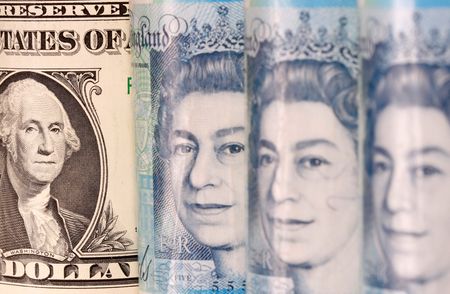By Samuel Indyk
LONDON (Reuters) – The British pound was steady within the middle of its recent range on Wednesday as investors awaited key U.S. inflation data, while uncertainty stemming from U.S. President Donald Trump’s trade policy continued to keep investors on edge.
Sterling was little changed against the dollar at $1.2443. It was down slightly at 83.37 pence per euro.
Attention in currency markets on Wednesday was on U.S. inflation data – due at 1330 GMT – which could help cement market expectations for the Federal Reserve to keep rates unchanged for the time being.
On Tuesday, Fed Chair Jerome Powell told lawmakers the central bank was in no rush to ease more given the strength of the economy.
In contrast, markets have moved to price in more easing from the Bank of England this year after the central bank cut the bank rate by 25 basis points last week.
BoE policymaker Catherine Mann, who had previously been viewed as the most hawkish member of the rate-setting Monetary Policy Committee, shocked markets by voting for a larger 50 basis point move.
On Tuesday, Mann said that sufficient evidence had built up of soft consumer demand, the risk of a sharp deterioration in the labour market and weakening corporate pricing power for her to drop her opposition to cutting rates.
“Confidence in the UK has been knocked because of the growth outlook,” said Jane Foley, senior FX strategist at Rabobank.
“I think sterling is going to struggle to find the enthusiasm that it had in parts of 2024.”
The threat of tariffs is also keeping currency traders on edge.
Investors have assumed U.S. tariffs would be positive for the dollar, by reshaping trade flows and encouraging other countries to weaken their currencies to offset the taxes.
Trump has vowed to impose reciprocal tariffs on every country that charges duties on U.S. imports by today, ratcheting up fears of a widening trade war.
But Rabobank’s Foley believed the UK may be more insulated from escalating trade tensions than other countries.
“Sterling perhaps looks a little less vulnerable than the euro,” she said, noting that the U.S. reports a trade surplus with Britain that might enable the UK to sidestep some of Trump’s tariffs.
(Reporting by Samuel Indyk; Editing by Bernadette Baum)











